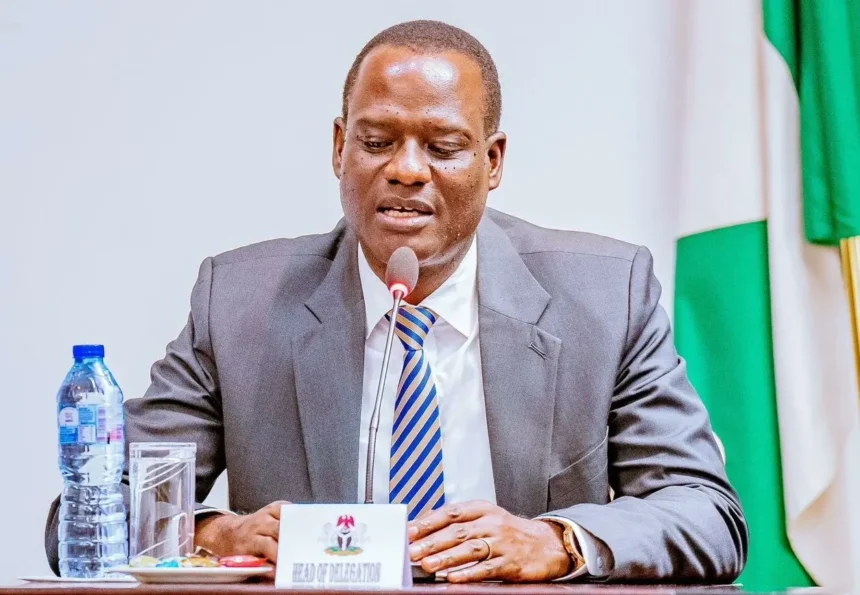News
NAFDAC Begins Enforcement Of Ban On Alcoholic Drinks In Sachets

The National Agency for Food and Drug Administration and Control has commenced the enforcement of the ban on the importation, manufacture, distribution, sale, and use of alcoholic beverages in sachets, PET, and glass bottles of 200ml and below.
The Director-General of NAFDAC, Prof Mojisola Adeyeye, stated this on Monday at a press conference in Abuja.
“As of January 31, 2024, there is no alcoholic beverage in these categories that are registered by NAFDAC. I also want to inform you that the agency has started enforcement actions to enforce the implementation of this policy. The window period given to manufacturers by NAFDAC to sell off all alcoholic drinks in this category elapsed on January 31, 2024.
“To this end on the first day, after the elapse of the window period, the agency commenced nationwide enforcement actions on February 1, 2024 to enforce the implementation of the new policy,” she said.
READ ALSO: NAFDAC Raises Alarm Over Illegal Importation Of Unregistered Medical Syringes
She added that during enforcement actions, it was discovered that some manufacturers of the banned products were still producing the products, and still had stacks of both finished products and packaging materials of the products in their possession.
“This situation is of course not acceptable, and the agency views this as flagrant disobedience to the laws of Nigeria. NAFDAC views this matter seriously and will engage all statutory means, which may include prosecution, to deal with the matter.
“I want to use this medium to ask all holders of alcohol in sachets, PET and glass bottles, empty sachets, PET bottles, empty glass bottles, and other packaging materials of these banned products to immediately report to the Investigation and Enforcement Directorate of NAFDAC for hand-over of same to NAFDAC for destruction, to prevent sterner measures including prosecution,” she declared.
In January 2022, NAFDAC stopped the registration of alcoholic beverages in sachet and small volume PET and glass bottles below 200ml.
READ ALSO: NAFDAC Probes ‘Poisonous’ Plantain Chips Allegation
This decision was based on the recommendation of a high-powered committee of the Federal Ministry of Health and NAFDAC, the Federal Competition and Consumer Protection Commission, and the Industry represented by the Association of Food, Beverages and Tobacco Employers, Distillers and Blenders Association of Nigeria, in December 2018.
As a result of the decision reached at the end of the committee meeting, producers of alcohol in sachets and small volume agreed to reduce the production by five per cent with effect from January 31, 2022, while ensuring the product is completely phased out in the country by January 31, 2024.
“NAFDAC committed to ensuring that the validity of renewal of already registered alcoholic products in the affected category does not exceed the year 2024.
“NAFDAC is resolutely committed to the strict implementation of the regulations and regulatory measures towards safeguarding the health of Nigerians, particularly the vulnerable youth, against the dangers of reckless consumption of alcohol,” Adeyeye assured.
READ ALSO: NAFDAC Fears 20% Nigerians May Die From NCDs, Moves Against Solid Fats In Foods
The don warned that the people mostly at risk of the negative effects of consumption of the banned pack sizes of alcoholic beverages are the under-aged, commercial vehicle drivers and riders.
“The World Health Organisation has established that children who drink alcohol are more likely to use drugs, get bad grades, suffer injury or death, engage in risky sexual activity, make bad decisions, and have health problems.
“The WHO also stated that harmful consumption of alcohol is linked to more than 200 health conditions including infectious diseases – Tuberculosis and HIV/AIDS; and non-communicable conditions- liver cirrhosis and different types of cancer. It is also associated with social problems, such as alcohol addiction and gender-based violence.
“To curb the menace of abuse of alcohol, WHO recommended some actions and strategies to policymakers that have shown to be effective and cost-effective, which includes regulating the marketing of alcoholic beverages, and regulating and restricting the availability of alcohol,” she explained.
News
OAU Unveils Seven-foot Bronze Statue Of Chief Obafemi Awolowo

…Yemisi Shyllon, other dignitaries praise Awo’s commitment to humanity
A giant bronze statue of the sage, Chief Obafemi Awolowo, was unveiled on Friday at the Obafemi Awolowo University (OAU), Ile Ife.
The statue, the worth of which was put at N120 million by the donor, has the sage dressed in his Senior Advocate of Nigeria (SAN) attire. It is of a height of seven feet, which goes to 15 feet after the inclusion of the pedestal.
Speaking at the unveiling, the Vice Chancellor of the university, Professor Adebayo Bamire, stated that the statue is a legacy project for the university.
Professor Bamire said the statue was a celebration of Chief Awolowo’s selfless service to humanity and expressed the appreciation of the university to the donor, Prince Yemisi Shyllon.
Prof Bamire noted that the life of Chief Awolowo should serve as a lesson for all to live for the good of the people.
“It is known that the soul of any civilisation, the very pulse of its humanity, beats strongest on its art, on its music, its literature, its visual splendour and its performances. This affirmation resonates with the Obafemi Awolowo University academic philosophy: ‘for learning and culture’—a culture of creativity and a creative culture.
READ ALSO:OAU Medical Student Kills Self After Failing Exam Twice
“The donor of the statue, Prince Yemisi Shyllon, is a man whose name resonates across continents. He is Africa’s foremost art collector, an accomplished creative mind, a committed philanthropist of extraordinary vision and a relentless advocate for cultural advancement and one of the most remarkable cultural ambassadors of our time.
“For a university like ours, dedicated to the holistic development of mind and spirit, this example is a beacon. It reinforces our own commitment to ensuring that the sciences converge with the humanities, that innovation dances with tradition and that our graduates are as culturally literate as they are professionally skilled.
“This iconic piece will not only beautify our campus but also serve as a permanent cultural marker, reminding future generations of the ideals of leadership, service, excellence and intellectual courage upon which this university was founded,” the Vice Chancellor said.
Speaking, the donor of the statue, Prince Yemisi Shyllon, stated that the project was aimed at celebrating Papa Awolowo for living a purpose-driven life.
Prince Shyllon said conceiving the project and funding it was his own way of saying thank you to Chief Awolowo for the sterling leadership he gave his people and for showing what meaningful life meant.
“Indeed, many people solely focus on material wealth, such as having cars, building and buying properties, buying private jets, jewelries and the many other worthless and selfish illusions of life, that are generally not meaningful to the real essence of human life,” he said.
READ ALSO:OAU Professor Slumps During Meeting, Dies En Route Hospital
He added that Chief Awolowo would be remembered forever for living for what was right and just even as he listed some of the enduring legacies of the sage.
Prince Shyllon pointed at “free education in the old Western Region, and other landmark projects such as the Cocoa House, Western Nigeria Television, Liberty Stadium, industrial estates, farm settlements and the Obafemi Awolowo University, among others” as worthy legacies left behind by Chief Awolowo.
Shyllon noted that the sage was a man who could be best described as an example of a person who lived a “meaningful life.”
He added that Chief Awolowo lived his life planting seeds for generations while leaving his indelible footprints on the sands of time.
He charged all to live the kind of life that would make humanity remember them for something positive, “just as Papa Obafemi Awolowo, who died 38 years ago.”
He stressed that the Holy Qur’an and the Bible preach the act of showing love to the needy, adding that all should not give to the needy for the purpose of getting anything in return.
READ ALSO:FULL LIST: Highest Goal Scorers In Europe’s Top Five Leagues
“Life is full of emptiness. Awolowo lived a meaningful, purpose-driven life and planted seeds through his various selfless services to humanity before his exit. That is why he is celebrated every day since he died 38 years ago,” he said.
In his remarks, Chairman, African Newspapers of Nigeria (ANN) Plc, publishers of the Tribune titles, and daughter of Chief Awolowo, Dr Olatokunbo Awolowo Dosumu, thanked Prince Shyllon for donating the statue.
She also appreciated the university for being receptive to the idea and for keeping the legacy of Chief Awolowo alive.
Ambassador Awolowo Dosumu, who was represented by the Editor, Saturday Tribune, Dr Lasisi Olagunju, noted that the project was a celebration of selfless service to the people which was what Chief Awolowo lived for.
READ ALSO:EFCC Arrests Over 70 OAU Students In Midnight Raid
“History is always there to reward selfless leadership and expose pretenders. We are here today in celebration of an uncommon man who died 38 years ago. This honour, this statue is a demonstration of what immortality means.
“Chief Awolowo gave his very best in the service of the people. We appreciate the donor, Prince Yemisi Shyllon, for the gesture and also appreciate the university for giving the right space for the erection of the statue. Good life is about services; what we are celebrating today is history’s reward for Chief Awolowo’s selflessness.
“Papa was one leader who believed that service to the people is a rent paid for the space we occupy in this world. The Awolowo family appreciates this monument and thanks the donor and the sculptor for doing a great job,” he said.
He urged students of the institution to learn from the life lived by Chief Awolowo and rededicate themselves to noble causes.
At the ceremony were principal officers of the university and other dignitaries, including Senator Babafemi Ojudu, who also said positive things about Chief Awolowo and the leadership he gave the Nigerian people.
(TRIBUNE)
News
FULL LIST: FG Selects 20 Content Creators For Tax Reform Education

The Federal Government has released a list of 20 content creators selected to support public education on Nigeria’s ongoing tax reforms.
The Presidential Fiscal Policy and Tax Reforms Committee issued the announcement, which was posted on Thursday by its chairman, Taiwo Oyedele, on X.
The list, titled “Top 20 Content Creators for Tax Reform Education,” was shared after the organisers received 8,591 nominations covering more than 200 creators.
The organisers said the selected creators will attend a special training session designed to deepen their understanding of the new tax laws so they can share clearer and more balanced information with their audiences.
READ ALSO:FG Revokes 5% Telecom Tax On Voice, Data Services
They encouraged Nigerians to tag any creator on the list and ask them to confirm their interest by completing the acceptance form.
“If your favourite creator is on the list, tag or mention them and ask them to confirm their interest by completing this form: forms.gle/Ph49kSE4okDf6g….
“Deadline for acceptance is Monday, 8 December 2025.
“Tell us the areas of interest and key issues you’d like the training to focus on in the comments section.”
According to the announcement, the creators were ranked by their followership across major platforms. The top 20 include:
READ ALSO:FG Gazettes New Tax Reform Laws
1. Financial Jennifer
2. Onlinebanker
3. Don Aza
4. Mary Efombruh
5. Baba Ogbon Awon Agba International
6. Perpetual Badejo
7. Personalfinancegirl
8. Tomi Akinwale
9. Emeka Ayogu
10. Aderonke Avava
11. Odunola Ewetola
12. Christiana Balogun
13. Mosbrief
14. Chidozie Chikwe
15. Zainulabideen Abdulazeez
16. Chinemerem Oguegbe
17. Oyagha Michael
18. Ayomide Ogunlade
19. Ayọ̀dèjì Fálétò
20. Vera Korie
News
Rufai Oseni Breaks Silence On Alleged Suspension From Arise TV

Arise TV presenter, Rufai Oseni, has debunked viral claims suggesting he was suspended from the station.
Oseni explained through a series of posts on X on Friday that he has been on planned leave from work, adding that the station had publicly announced the start of his leave weeks earlier.
He described the rumours of his suspension as unfounded fabrications circulated on social media and noted that verifiable information confirming his leave status had already been made available.
Oseni stated that he intends to resume his duties after completing his period of rest.
READ ALSO:Onanuga Reacts To Attempted Military Takeover In Benin Republic
He wrote, “I was not suspended. The lies and fabrications are terrible. Social media na wa.”
In another tweet, he wrote, I have worked for about a year and I decided to go on leave. After I rest small I go return. I love you all.
“At the start of my leave on Thursday last two weeks , it was announced on TV I went on leave. Empirical facts Dey, so data bois that lied about suspension Una jam Zuma rock,” he tweeted.

 Entertainment5 days ago
Entertainment5 days ago2face, Natasha Fight Dirty On Instagram Live Amid Singer’s Alleged Arrest In UK

 News4 days ago
News4 days agoEdo Assembly Recalls 324 Employment Letters

 News4 days ago
News4 days agoImansuangbon Donates To Benin IDPs, Charges Wealthy Nigerians To Advance Humanity

 News5 days ago
News5 days agoEdo Assembly Summons 2Baba’s Wife Before Ethics Committee

 Sports5 days ago
Sports5 days agoEPL: Mikel Obi Reveals Why Chelsea Failed To Beat Arsenal in 1-1 Draw

 Metro2 days ago
Metro2 days agoEdo: How Pastor Hypnotised My Daughter, Made Her Abandoned NNPCL- Mother

 Business4 days ago
Business4 days agoJUST IN: CBN Removes Cash Deposit Limits, Raises Weekly Withdrawal To N500,000

 Business5 days ago
Business5 days agoNaira Records Depreciation Against US Dollar Across Official, Black Markets

 Metro4 days ago
Metro4 days agoWhy We Killed Ogun FRSC Officer, Daughter — Suspect Manfriend, Herbalists

 News3 days ago
News3 days ago9 Common Resume Mistakes Graduates Make – And How To Avoid Them


























